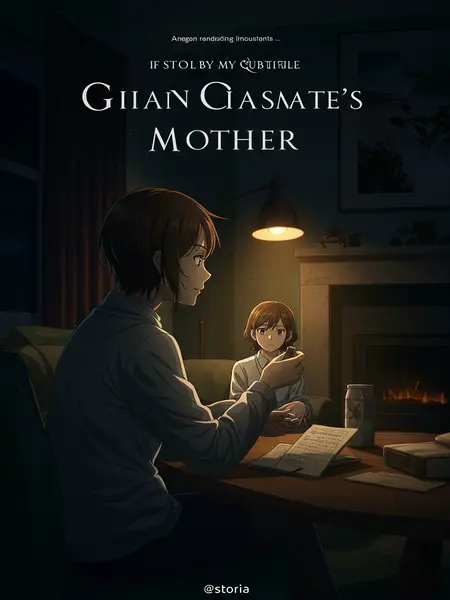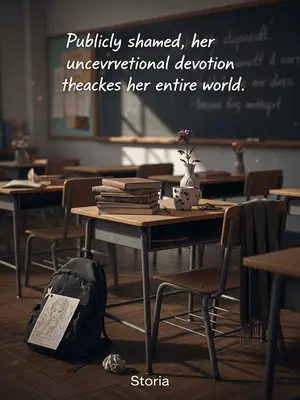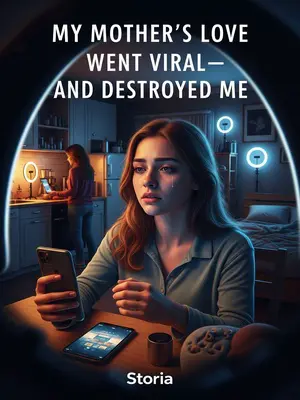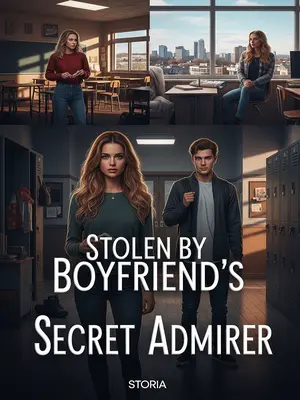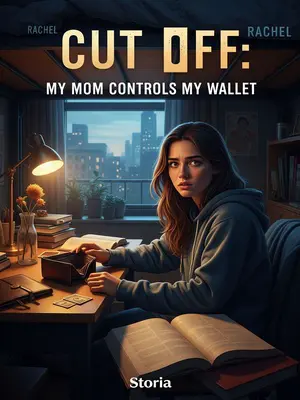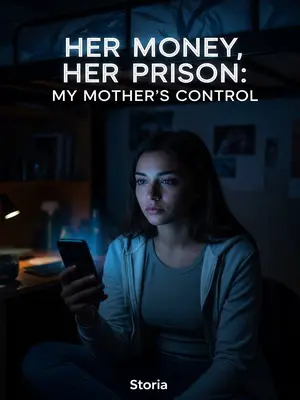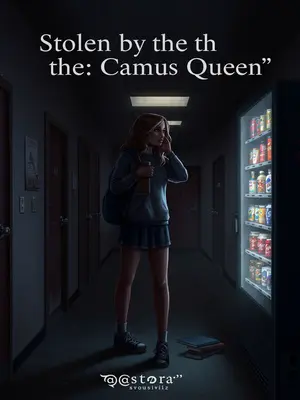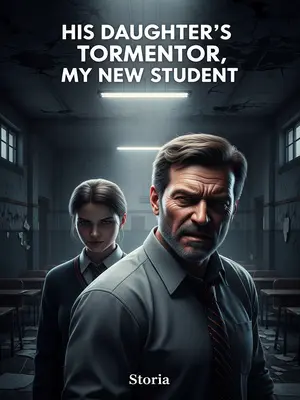Chapter 2: Broken Boys and Borrowed Mothers
2
I was still just a kid then. Some things I hadn’t figured out, but I was already acting on instinct.
But even if I had understood everything, maybe that wouldn’t have helped.
Let’s talk about me.
My name’s Caleb Foster. The year I met Natalie, I’d just started my second year of middle school.
Let’s rewind a few years. In second grade, my parents divorced.
Because my dad had more money, I went with him. That’s the excuse I give people.
The real reason? My mom didn’t want me.
She looked gentle and soft, but she had a backbone—she couldn’t stand betrayal. Because my dad cheated, and because I covered for him, my mom left us in a heartbeat.
I told her I only covered for Dad because I was scared they’d split up, not because I wanted to lie. I rattled off all my good qualities—good grades, nice personality, hard worker, would be a good son—hoping she’d want custody.
But she didn’t want me.
Because I missed her, I’d cry at home, clinging to her old clothes.
My dad barked, "Quit bawling, Caleb. You wanna be a crybaby your whole life?" He snatched her clothes away, tossed them out, and locked me in my room. I watched from the window as the garbage truck rolled off, my nose pressed to the glass, the world outside so bright and cold it stung my eyes.
My dad cooked, but if I said it tasted bad, he’d dump it and toss me a fifty. If I got hungry, I had to go buy food myself.
There were nights I ate microwaved pizza rolls at the kitchen counter, TV buzzing in the background, wishing I could call my mom and ask her to make tomato soup. My dad was always working, too busy to care. I was left to figure things out alone.
I’d show up at my mom’s job, wait for her, find out where she lived, and knock on her door.
She was surprised, pulled me in, looked me over. She said my face was dirty, my hair a mess, my clothes stank and the collar was yellow.
She told me to shower, made me a bowl of mac and cheese, took me for a haircut, and we strolled the park.
I wrote about that day in an essay called "An Unforgettable Day." My teacher didn’t get what made it so special.
After that, I’d visit my mom every week, sometimes making myself extra dirty just so she’d scold me more.
But eventually, my mom got tired. She told me I was grown and needed to take care of myself.
By fourth grade, she was cold. She used to spend the whole day with me, but after a while, when I’d come over, I was just a guest—after a few minutes, she’d find a reason to go out and tell me to head home.
Sometimes she just wasn’t home, and if I couldn’t get in, I had to go back.
Later, she remarried, moved, changed jobs, changed her number.
All of fifth grade, I didn’t see her again.
That year, I spiraled. I never combed my hair or washed my face, wore the same clothes for a month, and went to school looking like a mess.
Kids started calling me "Swamp Thing" behind my back. I didn’t study, snapped at everyone, cursed or fought over nothing. No one wanted to hang around me.
The teacher called my dad. First thing she said was, "At least clean the kid up—he looks like a street urchin." My dad nodded, lectured me, but forgot about it the next day.
He was busy and couldn’t keep track of me, except to toss me a couple hundred bucks for the laundromat or snacks to bribe classmates. Most problems, I had to deal with alone.
I’d buy Doritos and Dr. Pepper at the gas station, trying to bribe my way into friend groups. In the end, it didn’t really work. I was just lost, nothing to look forward to.
One time, I overheard a classmate’s mom say I "had no upbringing, obviously a kid without a mother," and I suddenly didn’t want to go to school anymore.
So I started skipping class, wandering the streets, going to grimy internet cafes to play games, and learned to smoke.
Sometimes I went to the park my mom used to take me to, sitting around for hours.
Life just kept going like that.
Until one New Year’s, I saw my mom from a distance, holding a little girl’s hand, walking in the park.
The air was sharp and cold, full of that dry, metallic Midwest winter smell and the smoke from someone’s chimney. I rubbed my eyes—it was really her.
I jumped up, brushed off my jeans, ready to run over, but then I saw the little girl.
She wasn’t my mom’s child, but her new husband’s daughter, and my mom treated her like her own, dressing her up cute.
The kid wore a puffy pink coat, like a marshmallow. She held a caramel apple, skipping along, her face shining with happiness.
I got so mad my head buzzed. I ran over, shoved the girl down, and snatched her caramel apple.
It was pure instinct, just rage. The girl burst into tears. My mom rushed over, picked her up, soothed her, checked her for bruises, then turned and slapped me.
My cheek stung instantly, the taste of caramel apple turning bitter in my mouth, the cold air biting at my skin.
I remembered my mom’s warning—don’t scratch or it’ll scar—so even with my cheeks itching from frostbite, I didn’t dare touch them.
Now my face was burning, the pain straight to my heart, but mixed with a weird relief. Like everything finally made sense.
My mom looked down at me and said something cold—I couldn’t hear it, my ears buzzing. I just watched her walk away with that girl, not looking back.
I finished the caramel apple, wandered around, then left too.
After that, I never went back to that park.
When I got home, I caught a bad cold, ran a fever, got delirious. Half-awake, I heard my mom’s footsteps by my bed.
I cried out for her, reaching for her, sobbing nonsense, but even in my dreams, she wouldn’t stay.
In the end, I dragged myself up and called my dad, who was on a business trip. He rushed back overnight and saved me.
The summer before middle school, I started taking care of myself.
I cooked, did laundry, ironed my shirts, scrubbed my collars, and kept my hair trimmed.
I watched YouTube for everything—how to boil pasta, how to tie a tie, how to get mustard out of a T-shirt. Before school started, I washed my backpack, bought new supplies, learned to cover my books.
I stopped fighting, cursing, smoking, skipping class. I learned to act well-mannered.
I brought a balanced breakfast, and during breaks, took out fruit to share with classmates.
Making sure no one found out I didn’t have a mom was more important than studying.
It took a lot just to look like I was cherished by my parents.
Yet some kids get all this without thinking. They mention what their mom said, snacks their mom made, new clothes their mom bought—like it’s nothing. They never realize it’s a gift from the universe.
They’d mention these things offhand, but it would leave me sad for days.
But I didn’t stay fragile forever. With other kids, I let it go.
I only cared about the girl in front of me.
The girl in front of me had a disorder, a weird personality, terrible grades, and couldn’t take care of herself—a total mess.
But her hair was always neat, her neck always clean, her collar never yellow, her clothes unwrinkled, and she always smelled good…
All these details proved she was loved. Her mom raised her so well.
Why did a hopeless kid still have a mom who wanted her…
But my mom didn’t want me?
Finally, I got it.
The reason I kept chasing Natalie wasn’t because I liked her—it was because I liked the way she was loved.
I never envied the careful grooming—I could do that myself. What I envied was that she could be unpopular and it didn’t matter, be a mess and not be scared, because her mom loved her.
So many times, during breaks, I’d see Ms. Reed crouch next to Natalie’s desk, speaking softly, stroking her hair, and I’d watch from behind, my eyes burning with jealousy.
After Ms. Reed left, I’d tap Natalie’s shoulder again.
I kept trying, kept prying into their mother-daughter life, but she always looked so calm, blank, and silent.
I couldn’t help but pay attention to her, but after I spoke, I’d feel this surge of anger inside.
It was like I was putting on a one-man show, while she just sat there, probably laughing at me inside.
Sometimes, as I talked, darker thoughts would pop up—I wanted to slap her, break that poker face, make her cry her heart out.
But I didn’t dare.
I kept remembering what happened in the park that year.
She had her mom to protect her—a confidence I’d never have.
3
I didn’t want to keep living like this.
There had to be a way out.
Why was Natalie so lucky? Was it just fate?
Couldn’t I fight for it myself?
If only Ms. Reed could be my mom.
That thought hit me one day—if a mom can change a kid, maybe a kid can change moms too.
Ms. Reed was divorced, my dad was divorced—why not get them together?
Ms. Reed wasn’t rich, my dad was loaded; after divorcing my mom, he turned into a sloppy mess, stomach problems from eating junk. Ms. Reed could probably help him.
Ms. Reed had so much love, but poured it all into Natalie and got nothing back. Natalie was cold, clueless, wouldn’t even call her "mom"—it was a waste.
What Natalie wasted was what I’d always wanted. If Ms. Reed became my mom, I could get some of that love.
Maybe at first, she wouldn’t really love me, but I’d be good to her, take care of her, and she’d come around.
If Natalie and I were siblings, I’d probably like her more. I’d be the good big brother, take care of my sister.
It was a perfect plan. I just needed to get them together.
My ideas weren’t so dark at first. Things hadn’t spun out of control yet.
4
To get Ms. Reed and my dad together, I had to plant the seed, make two strangers interested in each other.
I was the bridge. I had to connect them.
My dad’s side was easy; the real challenge was Ms. Reed.
To get Ms. Reed interested in my dad, I first had to win her trust and favor.
So, I started going even further to help Natalie.
I watched how they interacted, jumped in to help with anything, did odd jobs as long as they involved Natalie.
But there’s only so much a boy can do for a girl, so mostly I chatted with Natalie, helped her get food, explained homework. Whether she listened didn’t matter—it was all about showing Ms. Reed.
Ms. Reed was suspicious of my extra attention, but I was ready for that.
I told her Natalie reminded me of a cousin I always looked after, but lost touch with after my parents split. Seeing Natalie felt like seeing family.
That answer let her know my dad was divorced and hinted at wanting a sibling.
I also mentioned I liked geography and Ms. Reed’s teaching style. I said I saw how hard she worked, and wanted to help. Plus, I sat behind Natalie, so it just made sense.
I was a good student, so Ms. Reed already liked me. She relaxed pretty quickly.
Soon, Ms. Reed started looking out for me, too. She’d chat with me when visiting Natalie, bring me snacks, invite us to her office during study hall, even invite me to her home for dinner.
I felt cared for again for the first time in years. School started feeling like home.
Ms. Reed was gentle and pretty. I called her "teacher," but in my heart, she was already my mom.
I remember one night at her place—she made grilled cheese and tomato soup, and I felt warmer than I had in years. To make Ms. Reed like me even more, I studied harder. My grades shot up from top ten to number one in class.
I pretended to love geography, did tons of extra work, and visited Ms. Reed with questions. After a while, I actually got good, even won a prize in a competition.
Ms. Reed praised me for being smart, then sighed, her eyes drifting to Natalie, who sat with her head down, playing with her pencil.
I knew she was comparing us. I liked being compared.
Natalie was painfully slow in everything. What other kids learned in minutes took her months.
You never knew if she kept her head down because she wasn’t listening, didn’t understand, or just didn’t care.
You couldn’t motivate or discourage her. She was a still, dead pool—everything just sank to the bottom, never making a ripple.
Her reaction didn’t matter to me, since I was just putting on a show. But Ms. Reed was different—she wanted her daughter to improve.
Over the years, Ms. Reed was endlessly patient, repeating herself, teaching again and again.
But sometimes she broke down, too.
I once peeked through the office window and saw Ms. Reed break down with Natalie. She scolded and hit her, slapped her palm, pulled her ear, shook her, crying and shouting—
"Look at me, are you listening? Say something!"
"Why? What did I do to deserve this? What am I supposed to do with you…"
"Why is everyone else fine but you…"
Natalie didn’t flinch, just wailed dryly, her face twisted and strange, almost inhuman.
The whole scene slowed down in my head. I watched them with pity, wishing the moment would last so I could burn it into my memory.
Look closely—how much pain, despair, and helplessness in Ms. Reed’s face. She was a great teacher, a local hero, but all anyone saw was her "strength."
But being strong is a burden, too.
She didn’t choose it. She kept going because she had to, but after years of work, her daughter stayed the same.
Even if Natalie was slow, couldn’t she at least call her "Mom"?
Nothing. Just a block of wood, neither feelings nor brains.
A child like that, even if she’s harmless, is like a vampire—sucking out her mother’s love, pouring it into a bottomless pit, dragging her mother down.
From the moment she was born, her mother’s tragedy was set. Ms. Reed never gave herself another option.
I really did feel bad for her.
In the office, Ms. Reed hugged Natalie and sobbed. After scolding and hitting her, she broke down, blaming herself, apologizing.
When Natalie got hit, she wailed a few times, then went blank again, letting her mother hold her, silent.
Suddenly, her eyes shifted, landing on me outside the window.
Then she grinned—a slow, uncanny curve of her lips. My breath caught. For a second, I wondered if I’d just met the real Natalie, and if she’d been watching me all along.
